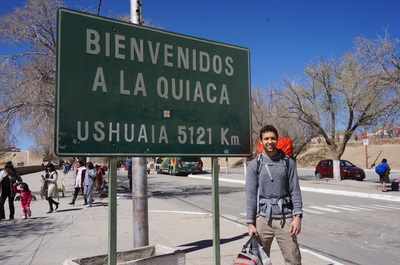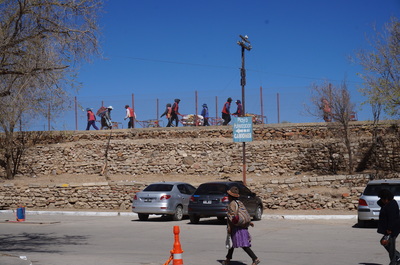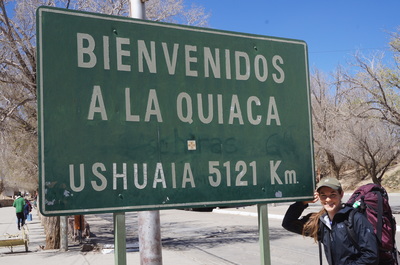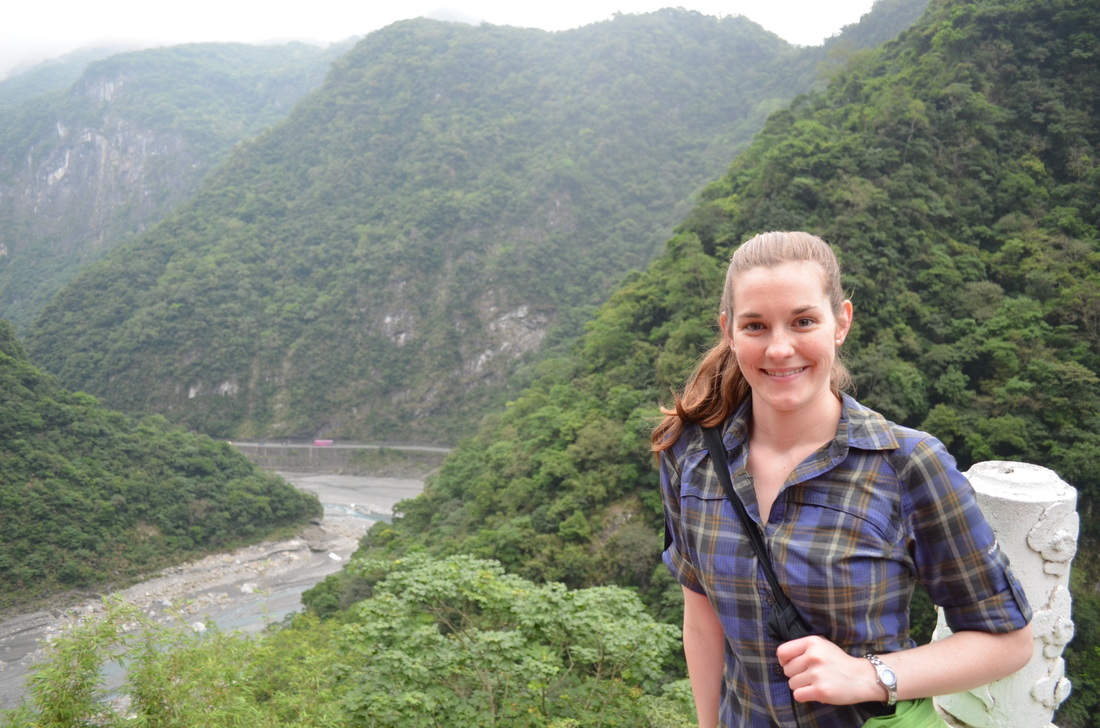La Quiaca is the most northern Argentinian town and is directly across the Bolivian border from Villazon. We stayed one night there in order to give us ample time to cross the border before catching our train to Uyuni. Something important to keep in mind is there is an hour time difference between Bolivia and Argentina. We awoke early at the Copacabana Hostel (highly recommended) and fought with the almost nonexistent internet in an attempt to at least book hostels for the next three towns. I am not sure why we were in such a rush because after all we were going to save an hour due to the time difference. In our hurry we made the poor decision of waiting to buy food in Bolivia… more on that later.
With our backs loaded up we walked from the hostel for about 6 blocks to the border crossing. We stopped to take photos with the sign marking the northern most point of Argentina and that to reach the southernmost point, Ushuaia (very close to where Nico is from), you would have to travel over 5,000 km. There is an official border crossing and an illegal border crossing. The best part is the illegal crossing is within sight of the legal one. We stood and watched for a moment as hordes of locals ran across with wheel barrows loaded up with goods.
Keep in mind that this border crossing is pretty shabby and not very well signed. I have actually read of travelers walking through it without being processed and later paying the consequences of “illegally” entering Bolivia. We walked through Argentinian immigration quickly and reached the less organized Bolivian immigration window. Just feet across the border and it was already blatantly obvious that Argentina and Bolivia are not on the same playing field. I handed the immigration officer my passport and 160 USD for my visa. I wish my country didn’t charge foreigners so much to visit the US because it means we have to pay a lot as well. The nice thing is that the visa is good for ten years. The man looked at my passport, examined each bill meticulously, set everything down, walked over to his desk and played with his phone, chatted with someone through a window, picked up my passport/money and left the building. As a seasoned traveler not a ton of things really rattle me. Someone nonchalantly leaving my sight with my passport and my cash qualifies as disconcerting. We waited with all our stuff still on our backs as people flowed through immediately behind us. After some serious waiting, he returned and calmly sat at his desk. It appeared that my visa was being processed, so Nico left to deal with his tax forms which were inconveniently out of sight. Since Nico is Argentinian, he doesn’t even need his passport to enter other South American countries. The crummy thing for him is that for tax purposes the Argentinian government requires its citizens to declare each electronic item they take out of the country with them. When they return they show the declaration and all is well. If they enter the country without a tax declaration, it means they must have purchased the item outside the country and thus owe the government 50% of its value. Ridiculous! Of course right about when he left a new immigration official arrived and informed me that sixty of my US dollars were not of good enough quality. I took them directly from my bank in Portland specifically for this visa and even had made sure they were crisp! What the heck. It was frustrating considering the fact that I only had one extra twenty. Thus, my piece of advice for other travelers is to always A. bring extra cash for your visas and B. make sure each bill is of the most recent date of issue. So in my elementary Spanish I told the man that I would wait for Nico to come back hoping that he had US dollars. I stood their shifting from one foot to another amazed by how long it took him to declare his stuff. About 40 minutes passed and finally he returned. He saved the day with sixty new US dollars. We were in!
As we walked into the town, Nico told me that the Argentinian official he dealt with felt uncomfortable for him for bringing so many electronics with him and gave him a strong warning of the safety of Villazon. Oh boy was he right. Everything felt so much grungier, the people stared at us, and it was clear we were no longer in Kansas. Already tired and sweating we proceeded to walk 15 blocks to the train station. I had read that the main situation in which people get mugged in Bolivia is in taxis and we had just withdrawn money from the ATM with many locals eyeing us.
As we entered the train station we saw an Argentinian group of three that we had passed in a restaurant the evening previously. We discussed the dire fact that there was no safe food available in the town and that we had an absurd wait ahead of us. One of them suggested not eating any unpackaged food due to the lack of sanitation in Villazon. The train was supposed to leave at 3:30pm and we arrived at noon. Don’t worry all the warnings we had read about Bolivian transit were correct the train left at 6:30pm. During the wait, Nico went out in search of some form of nutrition. He came back with a can of tuna that wasn’t really tuna and a can of mystery meat that once opened he couldn’t even accept eating. Luckily, we had one can left of Argentinian tuna, so we split it down the middle. We are healthy people, but we eat a lot. When we went to the food truck expo in Buenos Aires, Nati was surprised to realize that our first dish was only a snack and not our meal. We proceeded to buy two more dishes. Ergo, you can imagine the feeling of desperation when there wasn’t even an option to buy food to get us through the next 6.5 hours of waiting and 7 hours of a train ride. I am the type of person that would prefer carry an extra unnecessary 3 lbs. of food than not have anything at all.
Before boarding the train, I used the station’s restroom. The young girl manning it, pulled herself up on the counter while I was washing my hands and grabbed my necklace. In Spanish she asked me where I bought it and how much it cost. She said it looked expensive and that she wanted it. That was not my first clue that Bolivia was going to be an interesting experience.
Stay tuned for the bizarre train and the Uyuni Salt Flats! Welcome to Bolivia.
With our backs loaded up we walked from the hostel for about 6 blocks to the border crossing. We stopped to take photos with the sign marking the northern most point of Argentina and that to reach the southernmost point, Ushuaia (very close to where Nico is from), you would have to travel over 5,000 km. There is an official border crossing and an illegal border crossing. The best part is the illegal crossing is within sight of the legal one. We stood and watched for a moment as hordes of locals ran across with wheel barrows loaded up with goods.
Keep in mind that this border crossing is pretty shabby and not very well signed. I have actually read of travelers walking through it without being processed and later paying the consequences of “illegally” entering Bolivia. We walked through Argentinian immigration quickly and reached the less organized Bolivian immigration window. Just feet across the border and it was already blatantly obvious that Argentina and Bolivia are not on the same playing field. I handed the immigration officer my passport and 160 USD for my visa. I wish my country didn’t charge foreigners so much to visit the US because it means we have to pay a lot as well. The nice thing is that the visa is good for ten years. The man looked at my passport, examined each bill meticulously, set everything down, walked over to his desk and played with his phone, chatted with someone through a window, picked up my passport/money and left the building. As a seasoned traveler not a ton of things really rattle me. Someone nonchalantly leaving my sight with my passport and my cash qualifies as disconcerting. We waited with all our stuff still on our backs as people flowed through immediately behind us. After some serious waiting, he returned and calmly sat at his desk. It appeared that my visa was being processed, so Nico left to deal with his tax forms which were inconveniently out of sight. Since Nico is Argentinian, he doesn’t even need his passport to enter other South American countries. The crummy thing for him is that for tax purposes the Argentinian government requires its citizens to declare each electronic item they take out of the country with them. When they return they show the declaration and all is well. If they enter the country without a tax declaration, it means they must have purchased the item outside the country and thus owe the government 50% of its value. Ridiculous! Of course right about when he left a new immigration official arrived and informed me that sixty of my US dollars were not of good enough quality. I took them directly from my bank in Portland specifically for this visa and even had made sure they were crisp! What the heck. It was frustrating considering the fact that I only had one extra twenty. Thus, my piece of advice for other travelers is to always A. bring extra cash for your visas and B. make sure each bill is of the most recent date of issue. So in my elementary Spanish I told the man that I would wait for Nico to come back hoping that he had US dollars. I stood their shifting from one foot to another amazed by how long it took him to declare his stuff. About 40 minutes passed and finally he returned. He saved the day with sixty new US dollars. We were in!
As we walked into the town, Nico told me that the Argentinian official he dealt with felt uncomfortable for him for bringing so many electronics with him and gave him a strong warning of the safety of Villazon. Oh boy was he right. Everything felt so much grungier, the people stared at us, and it was clear we were no longer in Kansas. Already tired and sweating we proceeded to walk 15 blocks to the train station. I had read that the main situation in which people get mugged in Bolivia is in taxis and we had just withdrawn money from the ATM with many locals eyeing us.
As we entered the train station we saw an Argentinian group of three that we had passed in a restaurant the evening previously. We discussed the dire fact that there was no safe food available in the town and that we had an absurd wait ahead of us. One of them suggested not eating any unpackaged food due to the lack of sanitation in Villazon. The train was supposed to leave at 3:30pm and we arrived at noon. Don’t worry all the warnings we had read about Bolivian transit were correct the train left at 6:30pm. During the wait, Nico went out in search of some form of nutrition. He came back with a can of tuna that wasn’t really tuna and a can of mystery meat that once opened he couldn’t even accept eating. Luckily, we had one can left of Argentinian tuna, so we split it down the middle. We are healthy people, but we eat a lot. When we went to the food truck expo in Buenos Aires, Nati was surprised to realize that our first dish was only a snack and not our meal. We proceeded to buy two more dishes. Ergo, you can imagine the feeling of desperation when there wasn’t even an option to buy food to get us through the next 6.5 hours of waiting and 7 hours of a train ride. I am the type of person that would prefer carry an extra unnecessary 3 lbs. of food than not have anything at all.
Before boarding the train, I used the station’s restroom. The young girl manning it, pulled herself up on the counter while I was washing my hands and grabbed my necklace. In Spanish she asked me where I bought it and how much it cost. She said it looked expensive and that she wanted it. That was not my first clue that Bolivia was going to be an interesting experience.
Stay tuned for the bizarre train and the Uyuni Salt Flats! Welcome to Bolivia.





